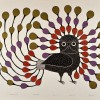EWING, NJ … A collection of vivid prints and drawings by Inuit artists from a single studio in a remote hamlet in Nunavut, Canada will be on display at The College of New Jersey Art Gallery from January 26-March 2.
The exhibit, Contemporary Inuit Art from Cape Dorset, showcases 26 works by artists from the Kinngait Studio in Cape Dorset, a municipality of just  under 1,300 people that is known worldwide as the “Capital of Inuit Art” for its enduring and revered creative output. The 11 featured artists span several generations and include a mother and son.
under 1,300 people that is known worldwide as the “Capital of Inuit Art” for its enduring and revered creative output. The 11 featured artists span several generations and include a mother and son.
Their works reflect their stark, northern surroundings. Beautifully rendered images of fish, whales, birds and people are often set against white or otherwise abstract backgrounds, and appear as treasured objects in a world that has few.
But the artwork is in no way static or uniform. Shuvinai Ashoona’s boy in thick, bright clothes performing a handstand has a whimsical feel, while Kenojuak Ashevak’s owl with radiating feathers is even fantastical.
“Commonalities of approach, technique and subject matter that result from shared experience and close working quarters are clearly apparent in the exhibited works, but so too are the unique points of view and distinct hand of each artist,” said Sarah Cunningham, College Art Gallery director.
She added, “The decision to foster individual artistic expression rather than a set number of products created by anonymous artisans is one of Kinngait Studios’ defining characteristics, and undoubtedly the root of its success and acclaim.”
The studio is part of the West Baffin Eskimo Co-operative (WBEC), which was incorporated in 1959. It was the first Inuit-owned co-operative formed with start-up assistance from the Canadian federal government to offer employment and retail services. It is unique among them for its sustained focus on the arts and artists of the community. The Co-operative’s membership represents the majority of the adult population of the community.
Kenojuak Ashevak, the Co-op’s best known artist, was the subject of a 1961 film, produced by the National Film Board, that focused on her traditional life and art. Her work has been reproduced on Canadian stamps.
The works are on loan from a private collection.
For more information about the exhibit, contact The College Art Gallery at tcag@tcnj.edu.

